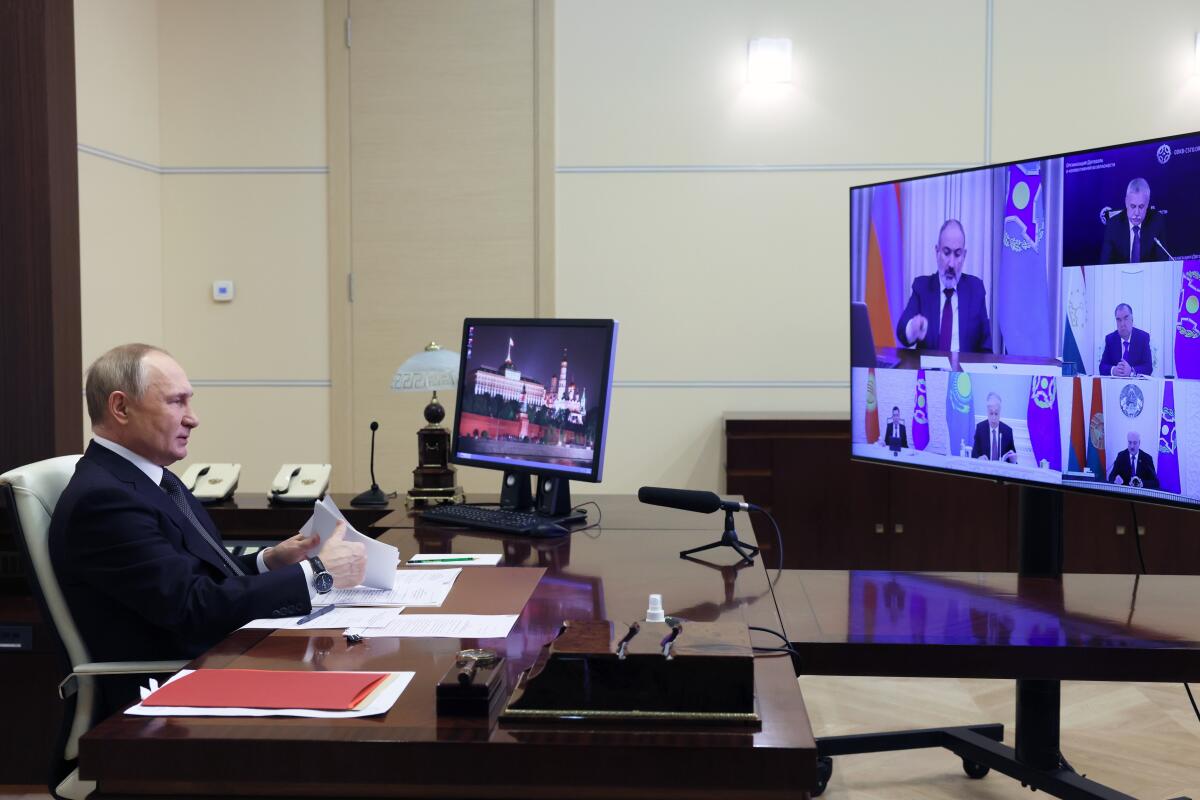Putin to host leaders of adversaries Armenia and Azerbaijan

- Share via
MOSCOW — Russian President Vladimir Putin will host the leaders of Armenia and Azerbaijan to help broker a settlement to a longstanding conflict between the two ex-Soviet neighbors, the Kremlin said Friday.
The negotiations reflect an attempt by the Kremlin to shore up its influence in the region amid increasingly active U.S. mediation efforts.
Putin’s talks with Armenian Prime Minister Nikol Pashinyan and Azerbaijani President Ilham Aliyev were scheduled to be held at the Russian leader’s Black Sea residence in Sochi on Monday.
The Kremlin said the leaders would discuss the implementation of a 2020 peace deal brokered by Russia and “further steps to enhance stability and security in the Caucasus,” adding that “the issues related to the restoration and development of trade and economic and transport links will also be discussed.”
Armenia and Azerbaijan have been locked in a decades-old conflict over Nagorno-Karabakh, which is part of Azerbaijan but has been under the control of ethnic Armenian forces backed by Armenia since a separatist war there ended in 1994.
During a six-week war in 2020, Azerbaijan reclaimed broad swaths of Nagorno-Karabakh and adjacent territories that had been held by Armenian forces for decades. More than 6,700 people died in the fighting, which ended with a Russian-brokered peace agreement. Moscow deployed about 2,000 troops to the region to serve as peacekeepers.
A new round of hostilities erupted in September, when more than 200 troops were killed on both sides in two days of heavy fighting. Armenia and Azerbaijan traded blame for triggering the fighting.
Russia is Armenia’s top ally and sponsor. It maintains a military base in Armenia but also has warm ties with Azerbaijan. The Kremlin has engaged in a delicate balancing act trying to maintain friendly relations with both countries.
After the latest bout of fighting, some Armenian officials voiced dismay at Moscow’s failure to take more decisive action to help Armenia, which is a member of a Russia-dominated security alliance of several ex-Soviet nations.
Moscow, in turn, was irked by Yerevan’s efforts to develop closer ties with Washington, which included a September’s visit by a U.S. congressional delegation led by House Speaker Nancy Pelosi (D-San Francisco).
Speaking at a conference of foreign policy experts on Thursday, Putin vowed that Moscow would help protect Armenia’s interests in any prospective deal.
“We have no intention to enforce or dictate anything to Armenia,” he said.
The Moscow-brokered 2020 cease-fire envisaged efforts to secure transportation routes in the region. Efforts to negotiate specifics led to acrimonious disputes and helped trigger the latest fighting in September.
In an apparent reflection of tensions with the Armenia, Putin noted Thursday that the Kremlin had advised Pashinyan’s government before the 2020 hostilities to agree to a compromise that would envisage Armenian forces giving up Azerbaijani lands outside Nagorno-Karabakh they seized in the early 1990s.
“We believed that it would have been a good step toward normalizing the situation in the region as a whole, but the Armenian leadership has taken a different path,” Putin said. “It has led to the situation that we have today.”
During the 2020 fighting, Azerbaijan reclaimed not only those territories but also seized significant chunks of Nagorno-Karabakh proper.
Putin maintained a prospective deal proposed by the U.S. would recognize Azerbaijan’s sovereignty over the entire Nagorno-Karabakh region.
“If Armenia shares this view, it’s fine,” Putin said. “We will support any choice made by the Armenian people.”
At the same time, he hinted that Russia could help Armenia negotiate a better deal that would allow Nagorno-Karabakh to retain a degree of autonomy. But he warned that Yerevan must be ready to make concessions.
“If the Armenian people and the Armenian leadership believe that Nagorno-Karabakh has some special characteristics that need to be recognized and reflected in a future peace treaty, it’s also possible,” Putin said. “But undoubtedly it’s necessary to hold negotiations to make a deal acceptable to Azerbaijan. It’s a difficult, hard issue.”
More to Read
Sign up for Essential California
The most important California stories and recommendations in your inbox every morning.
You may occasionally receive promotional content from the Los Angeles Times.













